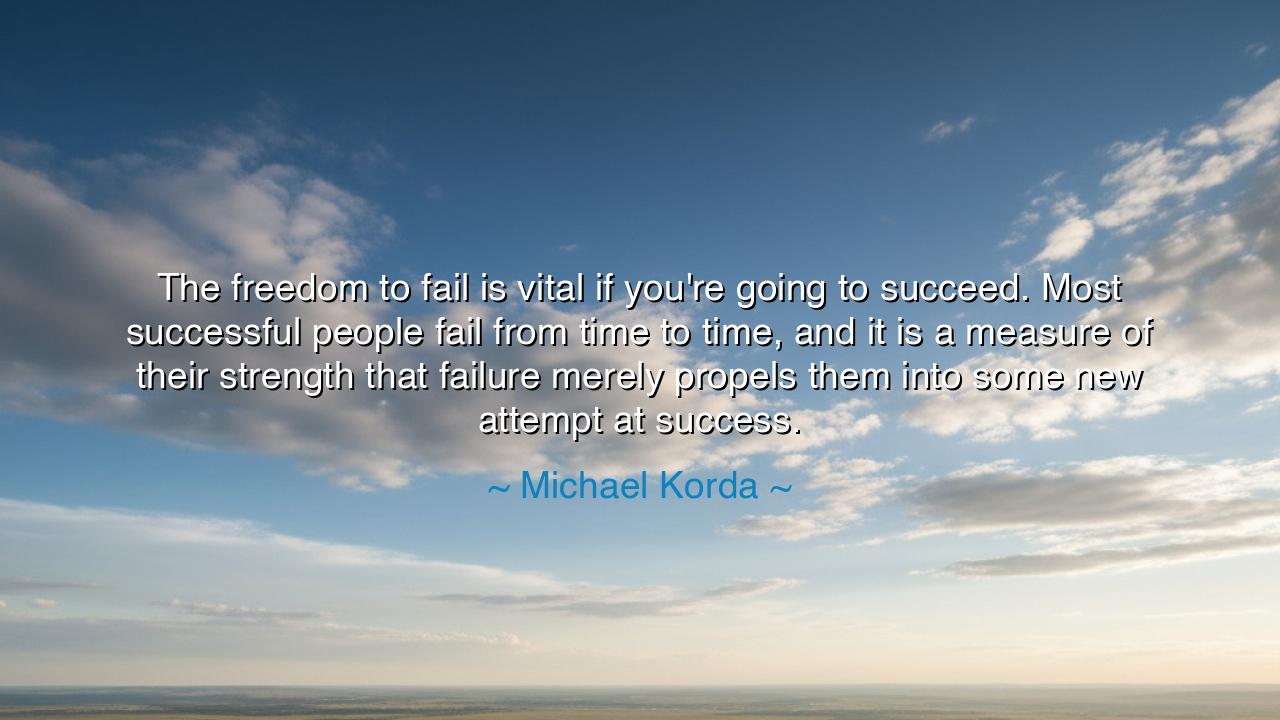
The freedom to fail is vital if you're going to succeed. Most
The freedom to fail is vital if you're going to succeed. Most successful people fail from time to time, and it is a measure of their strength that failure merely propels them into some new attempt at success.






Michael Korda, with the wisdom of one who studied both life and literature, once declared: “The freedom to fail is vital if you’re going to succeed. Most successful people fail from time to time, and it is a measure of their strength that failure merely propels them into some new attempt at success.” These words are not gentle flattery, but a stern truth wrapped in encouragement: that no man or woman ascends the mountain of triumph without first stumbling in the valleys below. Failure is not the opposite of success—it is the raw stone from which success is carved.
The origin of this truth lies deep in the human condition. From the first builders of civilization to the modern pioneers of science and art, all who achieved greatness bore first the scars of defeat. The error of the fearful is to imagine that failure is final, that to stumble once is to be unworthy of the path. But Korda reminds us that the very act of rising after a fall is itself a mark of greatness. It is through the freedom to fail, without shame or paralysis, that one discovers new ways, sharper insight, and stronger resolve.
History is filled with radiant examples. Consider Thomas Edison, who, when asked about the thousands of failed experiments in creating the electric light, replied that he had not failed, but found thousands of ways that would not work. His so-called failures were not tombstones, but stepping stones. It was his unyielding spirit, his strength to transform failure into fuel, that finally gave the world the gift of light. Without his willingness to fail, success would have remained in darkness.
Even nations bear this truth. The birth of the United States was marked not by swift victory but by repeated defeat. Washington’s army knew hunger, retreat, and humiliation. Yet each failure steeled them, each loss taught them strategy, each bitter moment bound them more firmly to their cause. Their eventual triumph did not come in spite of failure, but because they learned from it. This is the essence of Korda’s wisdom: failure propels, it does not paralyze, when faced with courage.
There is also a deep personal lesson in these words. Many souls shrink from risk, fearing the sting of disappointment. They bind themselves in chains of caution, never daring, never reaching, never falling—but also never rising. Yet true freedom is the freedom to fail: to attempt, to err, to learn, and to begin again. Without this liberty, the spirit suffocates. With it, the spirit grows mighty, for every fall strengthens the will, and every setback sharpens the mind.
Korda speaks of strength not as the absence of failure, but as the power to rise after it. The strong man is not he who never falls, but he who, bloodied and humbled, stands again with fiercer resolve. The strong woman is not she who never errs, but she who turns error into wisdom, using it as a ladder rather than a chain. Their measure is not in how often they fail, but in how swiftly they rise, how bravely they try again, and how steadfastly they refuse surrender.
So let this teaching endure: embrace your failures, for they are the secret architects of your success. Do not flee from them or cloak them in shame, but study them, learn from them, and rise renewed. When you stumble, do not linger in the dust, but let the sting of failure drive you to greater effort. For in the end, the crown belongs not to those who never fell, but to those who fell and rose a thousand times. And in that rising lies the truest strength of all.






AAdministratorAdministrator
Welcome, honored guests. Please leave a comment, we will respond soon